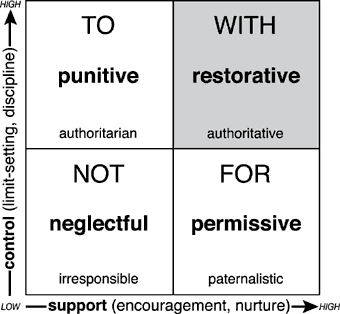An introduction to Restorative Practice
Last week I found myself in an Elizabethan mansion house surrounded by social workers, foster carers and two trainers. Over the next three days I would learn how to cross my arms the wrong way, unravel a forest of in-house social-work acronyms and move across the social discipline window from ‘not’ to ‘with’. If that all sounds a little ‘muddy’, perhaps I can explain…
I was attending this course on Restorative Practice as the the guest of West Berkshire Council. Inspired by the success of such a shift elsewhere, they are moving their emphasis to working restoratively across the board as part of their ‘building community together’ programme. In order to sustain such a radical change, it is important that both values and praxis are ‘anchored’ in the wider community. Hence, my presence as a local faith leader.
Restorative practice is the child of restorative justice, and recognises that doing things the way they have always been done (in justice or social care) will bring the results it has always brought. In the ‘social discipline window’ below, it seeks to move from doing things for (or to) people towards working with them:

CLICK for full size
To work in this way not only fosters positive working relationships, but furnishes long-term, sustainable results which reduce the need for continuing external input. With the right support and encouragement, people can find the solutions to their own problems for now, and learn how to find them in the future. This way of working has been rolled out across schools, social work teams, and even whole cities – with great success.
Those readers who are familiar with the Hunger Games will have watched as tributes in the arena scan the skies for signs of a silver parachute. These parachutes, sponsored by wealthy observers of the games, drift down from the sky with some small gift attached which might sustain life in the brutal arena for another few hours. They can, of course get lost, stolen, or misused. Once opened, and their cargo consumed, they leave their recipient scanning the unforgiving sky for another and another. Like many other elements of the Panem trilogy – it rings uncomfortably true.

Image victorsvillage.files.wordpress.com/
Needs in the social care arena will increase rather than decrease, without a doubt. Not only that, but resources available to meet them will diminish over time. Anything which can help people to find and devise their own resources, whilst also investing in a quality of relationship which makes it good to be human gets my vote.
Find out more here.

Fascinating stuff. Encouraging self-help rather than doing things for people has got to be the best model for building confidence and independence.
If we take the simple Christian message of salvation each person has to make the choice – no-one can do it for them.
As for acronyms I have just checked the GPDO and the UCO order along with the TCPA and the NPPF and I feel fairly confident that your MCU is PD and will not require express PP. (planning speak for those unaware!!)
Thanks a lot for sharing a wonderful Blog. i like your job.